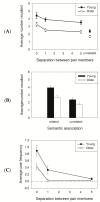Age-Related Deficits in Memory Encoding and Retrieval in Word List Free Recall
- PMID: 30513678
- PMCID: PMC6316770
- DOI: 10.3390/brainsci8120211
Age-Related Deficits in Memory Encoding and Retrieval in Word List Free Recall
Abstract
Although ageing is known to affect memory, the precise nature of its effect on retrieval and encoding processes is not well understood. Here, we examine the effect of ageing on the free recall of word lists, in which the semantic structure of word sequences was manipulated from unrelated words to pairs of associated words with various separations (between pair members) within the sequence. We find that ageing is associated with reduced total recall, especially for sequences with associated words. Furthermore, we find that the degree of semantic clustering (controlled for chance clustering) shows an age effect and that it interacts with the distance between the words within a pair. The results are consistent with the view that age effects in memory are mediated both by retrieval and by encoding processes associated with frontal control and working memory.
Keywords: ageing; free recall; memory encoding; memory retrieval; semantic clustering.
Conflict of interest statement
The authors declare no conflict of interest.
Figures

References
-
- Craik F.I.M., McDowd J.M. Age differences in recall and recognition. J. Exp. Psychol. Learn. Mem. Cogn. 1987;13:474–479. doi: 10.1037/0278-7393.13.3.474. - DOI
-
- Howard M.W., Kahana M.J. A distributed representation of temporal context. J. Math. Psychol. 2002;46:269–299. doi: 10.1006/jmps.2001.1388. - DOI
-
- Craik F.I.M., Jennings J.M. Human memory. In: Craik F.I.M., Salthouse T.A., editors. Handbook of Aging and Cognition. 1st ed. Erlbaum; Hillsdale, NJ, USA: 1992. pp. 51–110.
LinkOut - more resources
Full Text Sources

